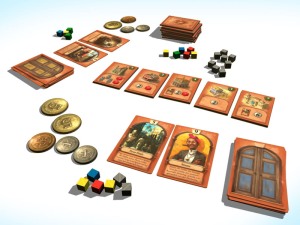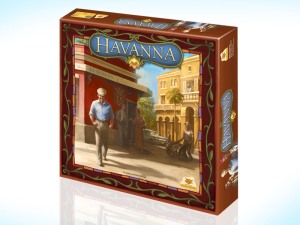Review: Havana
Posted by James (admin) on November 10th, 2009
 Playing role cards each round to perform actions isn’t a new idea but the fresh ideas in this game sounded like they would give it a new and interesting twist.
Playing role cards each round to perform actions isn’t a new idea but the fresh ideas in this game sounded like they would give it a new and interesting twist.
In Havana, players try to earn as many points as possible by using workers, cash and materials to build buildings. Each turn, players will carry out two actions based on the role cards they have in front of them. These actions include things like taking half the cash in the middle, gaining workers, stealing materials from other players, and more. Each player starts the game with an identical set of role cards to pick from.
Each role has a single digit on it and turn order each round is based on players comparing the two-digit number that these two digits create. For example, a player with role cards showing a 2 and a 7 will go before a player with cards showing a 3 and a 6, because 27 is lower than 36. (Note that the cards are always arranged so that the lower digit goes first, i.e. 2 and 7 will always be 27 and never 72.) Each player performs their actions and then builds any buildings, if they have the items required, before the next player in the turn order takes their turn. Once all players have had their turn, some cash and building materials are added to the middle.
Finally, all players secretly select and place one new role card from their hand on top of one of their current role cards. When everyone has selected their, the cards are turned over. The new role takes the place of the old role card it is on top of and this will probably change the turn order. For example, a player has roles with digits 4 and 6 showing – they then place a role with digit 1 on top of the 6 – their two-digit number for tun order is now 14 (it was 46 before).
 Havana has two very clever game mechanics. First, the turn order number and the role cards mechanic is great. Not only do you have to think about what roles you want to use but you also have to think about how they affect your turn order number too because turn order is often critical. I found that the roles with low numbers tended to deliver less gains than the higher numbers but meant I’d go first so that gave a nice balance. You also need to consider what roles your opponent(s) will have available too as some roles can protect you against their stealing actions. Finally, only when a player has two or fewer role cards in their hand do they get their role cards back, so once you’ve covered a role it may be a while before you get to use it again. Lots to consider.
Havana has two very clever game mechanics. First, the turn order number and the role cards mechanic is great. Not only do you have to think about what roles you want to use but you also have to think about how they affect your turn order number too because turn order is often critical. I found that the roles with low numbers tended to deliver less gains than the higher numbers but meant I’d go first so that gave a nice balance. You also need to consider what roles your opponent(s) will have available too as some roles can protect you against their stealing actions. Finally, only when a player has two or fewer role cards in their hand do they get their role cards back, so once you’ve covered a role it may be a while before you get to use it again. Lots to consider.
On top of this, the building purchase mechanic is simple but very clever too. The buildings available for building are laid out in two rows; however, a player can only build buildings that are at either end of the two rows – so there are only four available for building at any time. When a building has been built, the player removes it (claiming it for the points) and the next building in the row is now available to be built. If a row is ever reduced to just two buildings, four new buildings are placed in between them. This is a very simple method but it means you can see what buildings may be available soon which allows you to plan ahead but still means you can’t just build anything at any time – this makes players more competitive.
The game ends when any player has reached a fixed point goal: 25 points in a 2-player game, 20 points with 3 players and 15 points with 4 players.
Overall, Havana is a superb small game with lots of interaction. Simple and fast but very strategic with clever and fresh gameplay. It reminded me of San Juan but I think I enjoyed this even more and loved the tricky decisions it forced me to make. I read a comment somewhere that a player felt it wasn’t possible to plan. We didn’t find this at all; in fact, we found almost the opposite as we tried to work out what the other player would do and create our strategy. The turn order was vital to us with certain roles because going second meant some items (or even buildings)you wanted wouldn’t be available. Maybe this was because we played with 2 players as I can imagine it being a bit harder to predict with more players. Still, this is a game I will definitely buy when the English language version reaches the UK – it was one of the few I liked a lot that I didn’t buy at Spiel itself. With no board this will probably be a new addition to my small bag of 2-player games for when I travel.
James.
[Played with 2 players]
Second Opinion: Read the thoughts of the other player (my friend Rick) at: http://www.gamesetupmatch.com/news.htm#11


December 20th, 2009 at 3:41 pm
Hey James
I picked this up at Essen (in English) and have played it with 2 and 3 players. 2 players I thought was very good; 3 players was very very good. An excellent addition to the Cuba stable, and rather like SJ to PR – certainly as good.
Thanks for a good review.
December 23rd, 2009 at 2:00 am
Hi Joseph,
Thanks for the positive comment. Great to hear you like Havana too and that it played well with 3 too.
Cheers,
James.